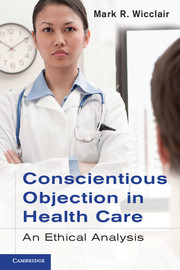Book contents
- Frontmatter
- Contents
- Preface
- 1 Introduction
- 2 Three approaches to conscientious objection in health care: conscience absolutism, the incompatibility thesis, and compromise
- 3 Ethical limitations on the exercise of conscience
- 4 Pharmacies, health care institutions, and conscientious objection
- 5 Students, residents, and conscience-based exemptions
- 6 Conscience clauses: too much and too little protection
- References
- Index
2 - Three approaches to conscientious objection in health care: conscience absolutism, the incompatibility thesis, and compromise
Published online by Cambridge University Press: 05 June 2012
- Frontmatter
- Contents
- Preface
- 1 Introduction
- 2 Three approaches to conscientious objection in health care: conscience absolutism, the incompatibility thesis, and compromise
- 3 Ethical limitations on the exercise of conscience
- 4 Pharmacies, health care institutions, and conscientious objection
- 5 Students, residents, and conscience-based exemptions
- 6 Conscience clauses: too much and too little protection
- References
- Index
Summary
Conscience-based refusals to provide legal and professionally accepted health care goods and services appear to present a conflict between health care professionals and patients. On the one hand, patients seek goods and services to meet their health care needs and interests. On the other hand, health care professionals want to maintain their moral integrity, and doing so can prompt them to refuse to provide a good or service that will satisfy a patient's health needs and/or interests. Generally, an appropriate strategy for resolving such conflicts is to attempt to find a “reasonable compromise.”
Addressing conscientious objection in pharmacy, Julie Cantor and Ken Baum endorse the search for a compromise: “most people can agree that we must find a workable and respectful balance between the needs of patients and the morals of pharmacists” (Cantor and Baum 2004: 2010). This approach is also recommended by the American Pharmacists Association (APhA). Its “Pharmacist Conscience Clause” states: “APhA recognizes the individual pharmacist's right to exercise conscientious refusal and supports the establishment of systems to ensure patient's [sic] access to legally prescribed therapy without compromising the pharmacist's right of conscientious refusal” (Winckler and Gans 2006: 12).
- Type
- Chapter
- Information
- Conscientious Objection in Health CareAn Ethical Analysis, pp. 32 - 86Publisher: Cambridge University PressPrint publication year: 2011



